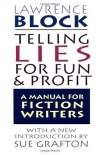Manual For Fiction Writers by Block, Lawrence (classic books to read .TXT) 📗

Book online «Manual For Fiction Writers by Block, Lawrence (classic books to read .TXT) 📗». Author Block, Lawrence
Defoe's early novels were similarly experimental. Journal of the Plague Year, Robinson Crusoe, etc. Moll Flanders, while closer in form to the conventional first-person narrative, was deliberately cast in the form of a memoir.
I suspect early novels took the form of fake documents because readers weren't prepared yet for fictional prose narratives. These transitional forms prepared the eighteenth-century reader for the novel as it came to evolve. Goal for Tomorrow's Run: Same six miles. And if that Airedale chases me again I swear I'm gonna kick his face in.
New York City
4 September 79
Mr. John Brady
Writer's Digest
Dear John,
Hope your Labor Day weekend was a good one. Mine was, well, laborious. We got back from Vermont and ran headlong into a mound of correspondence for the vegetarian restaurant guide.
Midway down the pile was your response to mine of 26 Aug. I was dismayed to learn you think the column topic is too slight and specialized, as I've been having further thoughts on it and feel it's a solid one. It seems to me there are a lot of angles I can cover.
For example, just how important is verisimilitude? On the one hand, the reader knows that the book he's holding in his hands is a novel, that some myopic fictioneer made up the whole thing and penned (or more likely typed) all the letters or diary entries. This being the case, one might argue that all other considerations should be subordinated to Telling the Story.
This certainly was the case in the first English novel, Richardson's Pamela. It's hard to believe Pam would have written at such length. The form is simply a device by means of which the author tells the story.
Same thing goes for two contemporary successes, Ring Lardner's You Know Me, Al, and John O'Hara's Pal Joey. While the narrative voice of each conveys the writer's character perfectly, we can't really believe that Lardner's baseball player or O'Hara's nightclub entertainer would actually write letters of this sort. Yet the books work, and could hardly work better.
On the other hand, there's a special treat for the reader when the writer does try for verisimilitude. When I can read a book and believe (in the sense of that voluntary suspension of disbelief essential for the success of fiction) that I'm reading real letters or a real diary, my enjoyment is greatly enhanced.
Example: Month or so ago I read A Woman of Independent Means, by Elizabeth Forsythe Hailey, a so-so seller in hardcover which word-of-mouth has made a paperback bestseller. The novel takes the form of a selection of a woman's correspondence over her entire lifetime. The lead character strikes different attitudes depending on the person to whom she's writing, omits certain points, bends the truth, and is thus revealed between the lines of her own letters and emerges as one of the most wholly realized characters I've met with in many years.
Another example, in a lighter vein: Some writers have enormous fun with this sort of format, especially in a couple of books that come to mind featuring not merely the letters written by the lead character but letters written to him as well. Wake Up, Stupid, by Mark Harris, is a wonderful example, as is Hal Dresner's The Man Who Wrote Dirty Books. I made a modest attempt of my own in a book called Ronald Rabbit Is a Dirty Old Man, but since it sold perhaps eighteen copies I don't think I'll bother referring to it in print.
Donald E. Westlake's Adios, Scheherezade deserves mention in this context. His narrator is trying to grind out a formula sex novel, but keeps wandering off the subject and typing fifteen-page letters to himself and/or the world instead of the fifteen-page chapters he's supposed to be writing. His desperate attempt to make himself write the book, and the sense you get of him hammering away at an out-of-control typewriter, helps make the book the delight it is.
Well, I'm rambling. I hope you'll reconsider and approve, even if grudgingly, a column on?what's the generic term for this sort of book, anyway? Novels in letter form are epistolary novels, but is there a term to cover them and diaries and similar gallimaufries? Documentary novel won't do; it sounds like some sort of non-fiction novel or faction or something.
I'm going back to the bean curd and the organic hot dogs. Keep punching, tiger.
Larry
DATE: 9 September 1979
PLACE: New York City
TIME OF RUN: 8:30 a.m.
DISTANCE COVERED: 16 miles
Comments: Lord, everything hurts. It's good I don't write with my feet, critics' observations to the contrary, because I couldn't manage it today. The nice thing about running back and forth on the West Side Drive is you don't have to worry about forgetting the route. The bad thing is everything else. But I covered sixteen miles today, and at this rate I ought to be able to run the Jersey Shore Marathon in December. Imagine how horrible I'll feel after that-
Note in yesterday's mail from Brady, giving an unenthusiastic okay to the column idea. One thing that bothers him is that the column would only deal with novels, while a large proportion of WD's readers are more interested in short fiction.
I spent maybe nine of this morning's sixteen miles trying to refute this argument. While the diary and epistolary forms may have been used more frequently in novels, there have certainly been short stories in these





Comments (0)